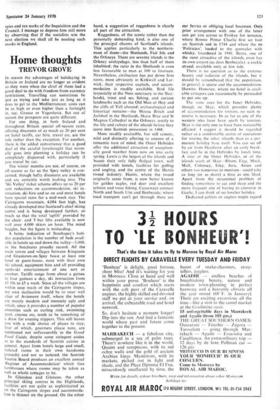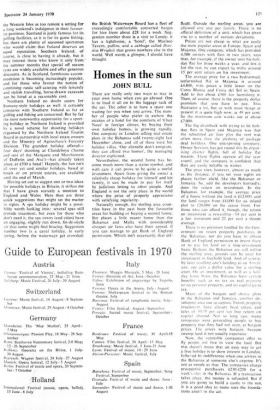Home thoughts
TREVOR GROVE
In season the advantages of holidaying in Britain or Ireland are no longer as evident as they were when the chief of them had a good deal to do with freedom from currency restrictions. Travelling can sometimes be just as trying and take just as long as it does to get to the Mediterranean; costs can be as high or even higher than a fortnight in, say, Greece or Yugoslavia. But out of season the prospects are quite different.
For one thing, in both Ireland and throughout Britain special off-season rates, offering discounts of as much as 20 per cent on hotel tariffs, car hire, travel etc, are the rule rather than the exception. For another, there is the added convenience that a good deal of the careful forethought that norm- ally goes into planning a holiday can be completely dispensed with, particularly if you travel by car.
The winter months are not, of course, an off-season as far as the Spey valley is con- cerned, though hefty discounts are available and are certainly worth looking into. The Ski Valley' ticket scheme offers up to 20 per cent reductions on accommodation, ski in- struction, ski hire and so on and most hotels have special rates for a mid-week stay. The Cairngorm mountain, 4,084 feet high, has already developed into Scotland's chief skiing centre and is being developed further, so much so that the total 'uplift' provided by the chair- and T-bar lifts available is now well over 4,000 skiers an hour. The mind boggles, but the figure is misleading.
A better indication of Strathspey's holi- day population is the number of beds avail- able in hotels up and down the valley-3,000, as the brochures proudly record. All the main towns and villages between Kingussie and Grantown-on-Spey boast at least one hotel or guest-house, most with their own ski school, equipment hire and all providing apres-ski entertainment of one sort or another. Tariffs range from about a guinea to four guineas a day, ski instruction from £3 lOs to £5 a week. Since all the villages are within easy reach of the Cairngorm slopes, my own inclination would be to steer well clear of Aviemore itself, where the hotels are mostly modern and intensely ugly and which, since it provides a number of popular amenities such as curling rink, swimming pool, cinema etc, tends to be something of a draw for evening trippers. This still leaves you with a wide choice of places to stay, four of which, gourmets please note, are mentioned not unfavourably in the Good Food Guide, despite some stringent asides as to the standards of Scottish cuisine in general. Apart from hotels large and small, isolated (some in their own handsome grounds) and not so isolated, the Scottish Tourist Board produces an excellent annual `Register of Accommodation' which lists farmhouses where rooms may be taken as well as whole cottages to let.
In Glenshee and Glencoe, the other principal skiing centres in the Highlands, facilities are not quite as sophisticated as On the Cairngorm slopes and accommoda- tion is thinner on the ground. On the other
hand, a suggestion of ruggedness is clearly all part of the attraction.
Ruggedness, of the scenic rather than the personally demanding kind, is also one of the principal charms of Scotland's islands. This applies particularly to the northern- most of them—the Shetlands, Fair Isle and the Orkneys. There are seventy islands in the Orkney archipelago, less than half of them inhabited; the ratio in the Shetlands is even less favourable to man at 100 to fourteen. Nevertheless, civilisation has put down firm roots, most obviously in Kirkwall and Ler- wick, their respective capitals, and accom- modation is readily available. Bird life (especially at the Noss sanctuary in the Shet- lands), trout and sea fishing, and curious landmarks such as the Old Man of Hoy and the cliffs of Yell abound; archaeological and historical remains—the Mousa Broch and Jarlshof in the Shetlands, Skara Brae and St Magnus Cathedral in the Orkneys, testify to the life and culture of the islands before they came into Scottish possession in 1468.
More readily accessible, but still remote, wild and distinctly alluring to anyone of a romantic turn of mind, the Outer Hebrides offer the additional attraction of exception- ally good weather from now on into early spring. Lewis is the largest of the islands and boasts their only fully fledged town, well provided with hotels, facilities for golfing and angling, and the centre of the Harris tweed industry. Harris, where the tweed originally came from, is now better known for golden eagles, red deer and excellent salmon and trout fishing. Causeways connect North and South Uist and Benbecula; where road transport can't get through there are
car ferries or obliging local boatmen. Only prior arrangement with one of the latter can get you across to Eriskay for instance, where Bonnie Prince Charlie first set foot on Scottish soil in 1744 and where the ss `Politician', loaded to the gunwales with whisky, foundered in 1941. Barra, one of the most attractive of the islands, even has its own airport (as does Benbecula): a cockle strand, available only at low tide.
There is no question as to the extreme beauty and isolation of the islands, but it should be remembered that the population. in general, is sparse and the accommodation likewise. However, where no hotel is avail- able cottagers can occasionally be persuaded to put one up.
The same goes for the Inner Hebrides, though on Skye, which provides plenty of accommodation for visitors, no such re- course is necessary. In as far as any of the western isles have been spoilt by tourism, Skye is the only one to have been noticeably affected: I suggest it should he regarded rather as a comfortable centre of operations for touring the other islands than as a per- manent holiday base itself. You can set off by air from Heathrow after an early break- fast and be in the Hebrides by lunch time. A tour of the Outer Hebrides. or of the islands south of Skye—Rhum, Eigg, Muck, Mull, Colonsay, Islay, Jura, Arran and others too numerous to mention—could take as long (or as short) a time as one liked. Apart from the occasional problem of finding somewhere to eat and sleep and the more frequent one of having to converse in Gaelic, I can think of no lovelier holiday.
Dedicated golfers or anglers might regard the Western Isles as too remote a setting for a long weekend's indulgence in their favour- ite pastimes. Scotland is justly famous for its golfing facilities, as it is for its game fishing, but there are plenty of seasoned sportsmen who would claim that Ireland deserves an equal reputation. Southern Ireland, of course, is close to having it already, but it may interest those who know it only from the summer months that special off season rates are widely available and offer generous discounts. As in Scotland, farmhouse accom- modation is becoming increasingly popular, and for those who favour the notion of combining rustic self-catering with leisurely and stylish travelling, horse-drawn caravans can be hired at a reasonable cost.
Northern Ireland no doubt caters for Romany-style holidays as well: it certainly compares with Southern Ireland as far as golfing and fishing are concerned. But by far the most noteworthy opportunity for a sport- ing holiday in Northern Ireland is provided by a novel scheme for shooting holidays organised by the Northern Ireland Tourist Board in partnership with local estate owners and the Ministry of Agriculture's Forestry Division. The grandest holiday offered— four days' shooting at Clandeboye (home and seat of the Marquess and Marchioness of Dufferin and Ava')—has already taken place, at £500 a head! Happily, the fun isn't all over yet and similar holidays, based at hotels or on private estates, are available until the end of March.
Having set out to suggest one or two ideas for possible holidays in Britain, it strikes me that I have given scarcely a mention to England and Wales. Here then are three quick suggestions that might set the matter to rights. A spa holiday might be a possi- bility worth looking into: several spas still provide treatment, but even for those who don't need it, the spa towns (and cities) have an engaging, slightly run down, fin-de-siecle air that some might find bracing. Suggestion number two is a canal holiday, in early spring, before the waterways get crowded: the British Waterways Board has a fleet of exceedingly comfortable converted barges for hire from about £28 for a week. Sug- gestion number three is a visit to Lundy: it has a lighthouse, a 'hotel', the Marisco Tavern, puffins, and a cabbage called Bras- sica Wrightii that grows nowhere else in the world. Well worth a glimpse, I should have thought.







































 Previous page
Previous page